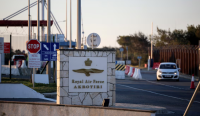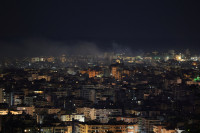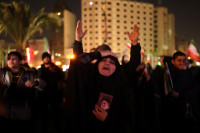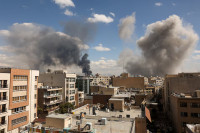World
Trump tells Iran to do deal now after Israel blasts nuclear and military targets
Iran vowed a harsh response after the overnight strike killed top military leaders. Israel said around 100 drones were launched in retaliation, a claim Iran denied.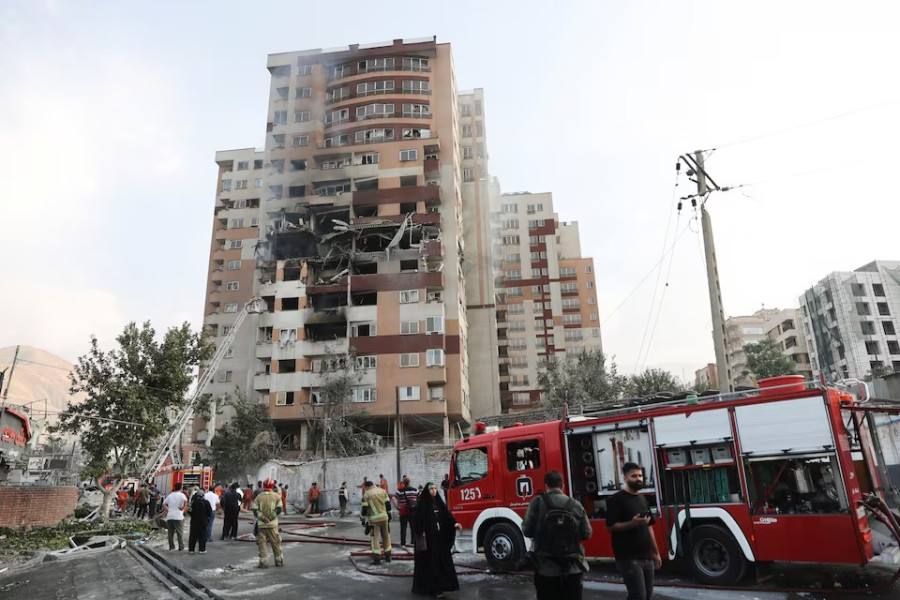
Reuters
Israel launched a barrage of strikes across Iran on Friday, saying it had attacked nuclear facilities and missile factories and killed a swathe of military commanders in what could be a prolonged operation to prevent Tehran building an atomic weapon.
Though Washington said it had no part in the attack, U.S. President Donald Trump, Israel’s main ally, suggested that Iran had brought the attack on itself by resisting a U.S. ultimatum in talks to restrict its nuclear programme.
“I think it’s been excellent. We gave them a chance and they didn’t take it ... They got hit about as hard as you’re going to get hit. And there’s more to come. A lot more,” he was quoted as saying on Friday in an interview with ABC News.
“Two months ago I gave Iran a 60-day ultimatum to ‘make a deal’,” Trump added in a post on Truth Social. “They should have done it! Today is day 61 ... Now they have, perhaps, a second chance!”
Iran promised a harsh response to the overnight onslaught, which killed the heads of both its armed forces and the powerful Revolutionary Guards. Israel said about 100 drones had been launched towards Israeli territory in retaliation, although an Iranian source denied this.
Around 0800 GMT, an order to Israeli citizens to remain near protected areas had been lifted, suggesting that most or all of the drones had been been intercepted.
In a televised message, President Masoud Pezeshkian urged Iranians to stand by their leaders and said a powerful response “will make Israel regret its foolish act”.
Iran told the United Nations Security Council, due to meet on Friday at Tehran’s request, in a letter that it will respond decisively and proportionally to Israel’s “unlawful” and “cowardly” acts.
Iran’s Nournews said 78 people had been killed and 329 injured in Israeli attacks on residential areas in Tehran.
The price of crude leapt around 8% on fears of wider retaliatory attacks across a major oil-producing region. The national Iranian oil company said refining and storage facilities had not been damaged and continued to operate.
OPEC Secretary-General Haitham Al Ghais on Friday said that the escalation between Israel and Iran did not justify any immediate changes to oil supply, as current conditions remain stable.
An Israeli security source said Mossad commandos had been operating deep inside the Islamic Republic before the attack and the Israeli spy agency and military had mounted a series of covert operations against Iran’s strategic missile array.
Israel also established an attack-drone base near Tehran, the source added. The military said it had bombarded Iran’s air defences, destroying “dozens of radars and surface-to-air missile launchers”.
Iran said several top commanders and six nuclear scientists had been killed, including the armed forces chief of staff, Major General Mohammad Bagheri, and Revolutionary Guards chief Hossein Salami.
In all, at least 20 senior commanders were killed, two regional sources said. The head of the Revolutionary Guards aerospace force, Amir Ali Hajizadeh, was also reported to be among them.
Iran’s Fars news agency, citing a security source, denied Israeli reports that Tehran had launched drones towards Israel.
IRANIAN NUCLEAR ENRICHMENT PLANT REPORTEDLY DAMAGED
Iran’s main nuclear enrichment facility at Natanz suffered significant damage, Israeli military spokesman Brigadier General Effie Defrin said.
Briefing journalists online, Defrin said 200 Israeli fighter jets took part in the strikes, hitting more than 100 targets, with others to work through, and that the operation might be lengthy.
Benjamin Netanyahu, Israel’s longest-serving prime minister, invoked the horrors of the Nazi Holocaust to justify his decision to attack Iran, framing the strikes as a decisive step to protect Israel from a future existential threat.
His office said he would speak to Trump later in the day.
Just before 6 a.m. Washington time, Trump posted on his Truth Social platform.
“I gave Iran chance after chance to make a deal,” he said.
“There has already been great death and destruction, but there is still time to make this slaughter, with the next already planned attacks being even more brutal, come to an end. Iran must make a deal, before there is nothing left...”
Iran’s Supreme Leader Ayatollah Ali Khamenei said in a statement that Israel had “unleashed its wicked and bloody” hand and would suffer “a bitter fate”.
At one time, Israel might have expected a wave of retaliation from Iranian-backed militias around the region. But since war erupted in Gaza in October 2023, Israel has severely weakened Iran’s allies, assassinating the top leaders of the Palestinian militant group Hamas and Lebanon’s Hezbollah.
Airlines quit the airspace over Israel, Iran, Iraq and Jordan after the Israeli strikes, Flightradar24 data showed, with carriers diverting or cancelling flights.
Israeli carriers El Al, Israir and Arkia said they were moving their planes out of Israel and Tel Aviv’s Ben Gurion Airport was shut.
Dubai-based Emirates cancelled flights to and from Iraq, Jordan, Lebanon and Iran as Iran closed its airspace.
However, merchant shipping continued to pass through the Strait of Hormuz at the mouth of the Gulf, although some shipowners were looking to avoid the region.
Israel remained on alert, shutting its embassies around the world and urging citizens via embassy websites to stay vigilant and avoid displaying Jewish or Israeli symbols in public.
Israeli military Chief of Staff Eyal Zamir said tens of thousands of soldiers had been called up and “prepared across all borders”.
Jordanian Foreign Minister Ayman Safadi joined global calls for de-escalation.
“At an extremely critical time when the U.S. was negotiating a nuclear deal with Iran that would save the whole region and the world, a new vicious escalation,” he said on X.
U.S. and Iranian officials had been scheduled to hold a sixth round of talks on Tehran’s escalating uranium enrichment programme in Oman on Sunday.
Oman, which is mediating in Iran-U.S. nuclear talks, described Israel’s attack as reckless and urged the international community to halt the “dangerous course of action”.
Iran’s armed forces spokesperson accused Washington of providing support for the operation. Secretary of State Marco Rubio said the U.S. had not been involved and that Israel had acted unilaterally in self-defence.
U.S. officials have repeatedly said any new nuclear deal - to replace a 2015 accord between Tehran and six world powers from which Trump withdrew - must include a commitment to scrap uranium enrichment, a prerequisite for developing nuclear bombs.
The Islamic Republic insists it wants nuclear energy only for civilian purposes. The IAEA’s Board of Governors on Thursday declared Iran in breach of its non-proliferation obligations for the first time in almost 20 years.
Some Iranian citizens opposed to the ruling clerics expressed hope that Israel’s attack might lead to their downfall, though one Tehran resident who was not a supporter of clerical rule said his country must retaliate.
“We can’t afford not to respond. Either we surrender and they take our missiles, or we fire them. There’s no other option — and if we don’t, we’ll end up surrendering them anyway.”
Trump was convening his National Security Council on Friday morning, the White House said.




 9.83°C Kathmandu
9.83°C Kathmandu
